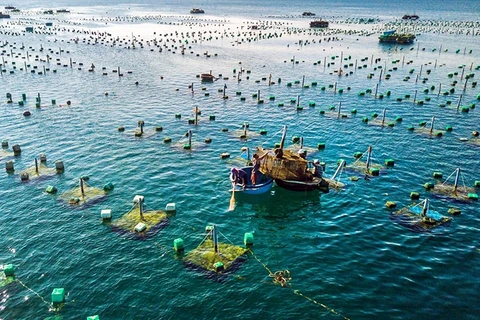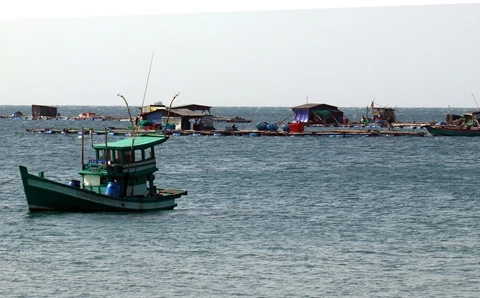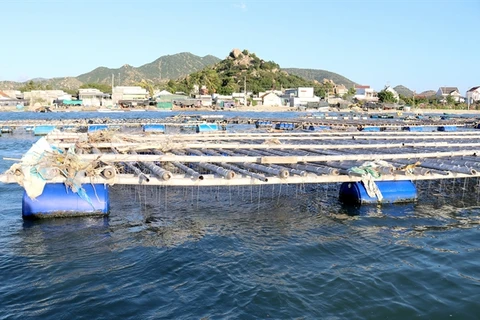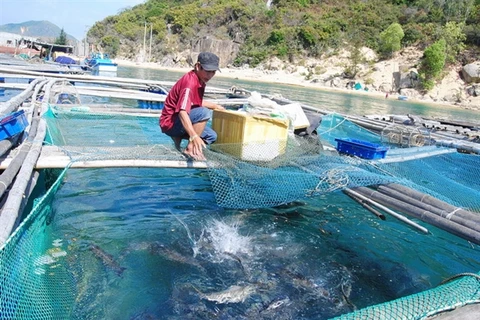Hanoi (VNA) - Vietnam boasts many advantages to develop marine aquaculture and tourism as a way to boost the industry and create more revenue from holidaymakers. However, this industry has not developed on par with potential as up to 99% of the aquatic farms are small businesses that are owned by households.
 A marine aquaculture model of STP Group JSC in Phat Co island, Quang Ninh province. (Photo: VietnamPlus)
A marine aquaculture model of STP Group JSC in Phat Co island, Quang Ninh province. (Photo: VietnamPlus) With a long coastline, with bays and islands, Vietnam has great potential to develop the marine aquaculture industry. However, its scale remains small, with the marine aquaculture area accounting for only 20% of the total coastal area. The small-scale nature of the industry needs to change to a larger-scale approach to match its potential.
The information was released at a webinar themed "Marine Aquaculture Development: Opportunities and Challenges" co-organised in Hanoi on August 16 by the National Centre for Agricultural Extension under the Ministry of Agriculture and Rural Development (MARD) and Nong Thon Ngay Nay (Countryside Today) Newspaper.
Huge potential for marine aquaculture development
Vietnam boasts huge potential for marine aquaculture development as it has 3,260 km of coastline and 1 million km of sea surface, of which about 500,000 hectares of water surface can be used for aquatic farming, said Tran Cong Khoi, Director of the Aquaculture Department under the MARD’s Directorate of Fisheries.
 Up to 99% of the marine aquaculture farms are of household scale, posing risks to fish farmers in case of natural disasters. (Photo: VietnamPlus)
Up to 99% of the marine aquaculture farms are of household scale, posing risks to fish farmers in case of natural disasters. (Photo: VietnamPlus) Nguyen Huu Dung, Chairman of the Vietnam Seaculture Association, said that despite great potential for marine aquaculture development, Vietnam also faces many difficulties. Up to 99% of the marine aquaculture farms are of household scale, posing risks to fish farmers in case of natural disasters.
Most of them apply traditional farming methods, utilising available materials to make cages, including those harming the environment, he said.
Other difficulties include low investment, poor mechanisation and farming techniques, scattered and disconnected marine aquaculture farms, and lack of quality control of fries and manufactured feeds, he said. Fish farmers also face obstacles in accessing loans and state support policies as banks do not recognise their fish cages as assets.
Combining marine aquaculture and tourism
Regarding solutions to promote sustainable marine aquaculture, Khoi said the Party and State have paid great attention to marine aquaculture in recent years, aiming to reduce catches and increase marine aquaculture.
The farming practice has been included in the 2017 Fisheries Law and guiding decrees. The Prime Minister has also issued Decision No. 1664/QD-TTg approving a project on marine aquaculture development to 2030, with a vision to 2045 and Decision No. 208/QD-TTg approving a project on changing some fishing activities affecting marine resources and the ecological environment.
“With the marine exploitation potential of 3.9-4 million tonnes, we have caught 3.6 million tonnes, so the reduction of coastal fishing is inevitable and it can be replaced by community-based marine aquaculture,” said Khoi.
Currently, there are many effective community-based marine aquaculture models in Vietnam, including those in Phu Yen, Binh Dinh, Ca Mau and Kien Giang provinces. These models are developed in the form of co-management, both managing coastal fishing and changing jobs for fishermen, thus reducing destructive coastal fishing practices.
In particular, models developing community-based tourism in combination with marine aquaculture are bringing high economic efficiency to farmers, thereby encouraging the development of marine aquaculture, Khoi said.
He expressed his desire that Vietnam have "marine aquaculture cities" as attractive tourist destinations, where the cages are evenly spaced like a city on the sea. In order to do this, the provinces need to soon have solutions for harmonious development of tourism and marine aquaculture.
Emphasising the importance of models to create markets for marine products, Dang Xuan Truong, head of the Fisheries Extension Department under the National Centre for Agricultural Extension, said in the coming time, it is necessary to develop marine farming models associated with tourism like those in Van Phong Bay in Khanh Hoa province and Phat Co island in Quang Ninh province.
Dung also stressed the need to develop community-based tourism in marine aquaculture areas. “With the motto of combining many different marine economic sectors, Vietnam will have a sustainable and effective marine economy in the near future,” he noted./.
























